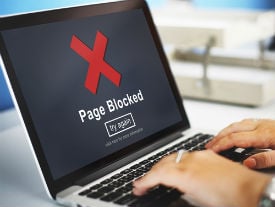 Entertainment companies have been taking legal action to have pirate sites blocked for more than a decade so it was only a matter of time before New Zealand had a taste of the action.
Entertainment companies have been taking legal action to have pirate sites blocked for more than a decade so it was only a matter of time before New Zealand had a taste of the action.
It’s now been revealed that Sky Network Television, the country’s biggest pay-TV service, filed a complaint with the High Court in September, demanding that four local Internet service providers block subscriber access to several ‘pirate’ sites.
At this point, the sites haven’t been named, but it seems almost inevitable that the likes of The Pirate Bay will be present. The ISPs are known, however. Spark, Vodafone, Vocus and Two Degrees control around 90% of the Kiwi market so any injunction handed down will affect almost the entire country.
In its application, Sky states that pirate sites make available unauthorized copies of its entertainment works, something which not only infringes its copyrights but also undermines its business model. But while this is standard fare in such complaints, the Internet industry backlash today is something out of the ordinary.
ISPs in other jurisdictions have fought back against blocking efforts but few have deployed the kind of language being heard in New Zealand this morning.
Vocus Group – which runs the Orcon, Slingshot and Flip brands – is labeling Sky’s efforts as “gross censorship and a breach of net neutrality”, adding that they’re in direct opposition to the idea of a free and open Internet.
“SKY’s call that sites be blacklisted on their say so is dinosaur behavior, something you would expect in North Korea, not in New Zealand. It isn’t our job to police the Internet and it sure as hell isn’t SKY’s either, all sites should be equal and open,” says Vocus Consumer General Manager Taryn Hamilton.
But in response, Sky said Vocus “has got it wrong”, highlighting that site-blocking is now common practice in places such as Australia and the UK.
“Pirate sites like Pirate Bay make no contribution to the development of content, but rather just steal it. Over 40 countries around the world have put in place laws to block such sites, and we’re just looking to do the same,” the company said.
The broadcaster says it will only go to court to have dedicated pirate sites blocked, ones that “pay nothing to the creators” while stealing content for their own gain.
“We’re doing this because illegal streaming and content piracy is a major threat to the entertainment, creative and sporting industries in New Zealand and abroad. With piracy, not only is the sport and entertainment content that we love at risk, but so are the livelihoods of the thousands of people employed by these industries,” the company said.
“Illegally sharing or viewing content impacts a vast number of people and jobs including athletes, actors, artists, production crew, customer service representatives, event planners, caterers and many, many more.”
ISP Spark, which is also being targeted by Sky, was less visibly outraged than some of its competitors. However, the company still feels that controlling what people can see on the Internet is a slippery slope.
“We have some sympathy for this given we invest tens of millions of dollars into content ourselves through Lightbox. However, we don’t think it should be the role of ISPs to become the ‘police of the internet’ on behalf of other parties,” a Spark spokesperson said.
Perhaps unsurprisingly, Sky’s blocking efforts haven’t been well received by InternetNZ, the non-profit organization which protects and promotes Internet use in New Zealand.
Describing the company’s application for an injunction as an “extreme step”, InternetNZ Chief Executive Jordan Carter said that site-blocking works against the “very nature” of the Internet and is a measure that’s unlikely to achieve its goals.
“Site blocking is very easily evaded by people with the right skills or tools. Those who are deliberate pirates will be able to get around site blocking without difficulty,” Carter said.
“If blocking is ordered, it risks driving content piracy further underground, with the help of easily-deployed and common Internet tools. This could well end up making the issues that Sky are facing even harder to police in the future.”
What most of the ISPs and InternetNZ are also agreed on is the need to fight piracy with competitive, attractive legal offerings. Vocus says that local interest in The Pirate Bay has halved since Netflix launched in New Zealand, with traffic to the torrent site sitting at just 23% of its peak 2013 levels.
“The success of Netflix, iTunes and Spotify proves that people are willing to pay to access good-quality content. It’s pretty clear that SKY doesn’t understand the internet, and is trying a Hail Mary to turnaround its sunset business,” Vocus Consumer General Manager Taryn Hamilton said.
The big question now is whether the High Court has the ability to order these kinds of blocks. InternetNZ has its doubts, noting that it should only happen following a parliamentary mandate.





